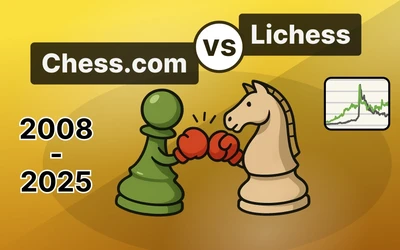
Barry Weatherall
Humans Make Consecutive Errors
"If you make consecutive threats, your opponent will blunder." - GM Dimitri KomarovAs always, opinions are my own, not those of Lichess.org.
In recent years I've been learning strategy games: Scrabble, go, shogi, and riichi mahjong. There's too much to memorize with the first two games, but at the last two I've become an expert by listening to advice from masters, and by reflecting on my wins and losses. Throughout all of these games one pattern has become clear: an expert exploits opponents' errors, while a master carefully avoids making consecutive errors.
It's fair to say that my blitz playing style is highly opportunistic (makes heavy use of traps). With apologies to all opponents in this blog... I win on the board, not the clock (watch my clock if you don't believe me; I slow down when I don't know what I'm doing):
Armed with this knowledge, there are two paths available to us:
- Spend countless hours memorizing tricky opening sequences to ensure the opponent makes the first error. (Or listen to masters' advice about key concepts in said openings, even if you can't remember the sequences.)
- Play simple openings and recognize when the opponent moves impulsively.
In Game 3 (above), having gained a 2-minute lead on the clock, I applied time pressure by getting a theoretically losing but highly complex endgame which couldn't be premoved. I play blitz with a 2-second increment, and as I slowed down setting traps I gave away my time advantage to win on the board.
In Game 4, it wasn't until I spent 30 seconds looking at and rejecting e3, e4, g3, g4, c3, Nh3, etc. that I wondered why all my candidate moves sucked and I started looking for other candidate moves, spotting the hanging queen.
I'm not here to win on time, I'm here to play chess! I play with an increment to ensure I never forget this... well, never say never...
Here is a game where I was paying more attention to the chess clock than to the game, at least until my opponent played the highly committal 34. c5 (after I spent 8 moves randomly shuffling pieces after 25... Bxf5):
We can't avoid making errors, but we can exploit opponents who do make consecutive errors while amassing a time advantage. Also, by spending our time (which is ours to spend) we can attempt to avoid making consecutive errors which cost us material (and cost us time trying to find how to recover).
"I was totally winning." This sounds familiar, no? Look, here is an example (from above). Watch my clock burn! My time is mine to spend until I find a reasonable plan. Curiously, once I sped up to 1-2 seconds per move (25. g4 through 27. Nf3?) I had to slow down again to avoid missing g6! a second time, and by playing slowly I saved many endgame minutes:
Image credit: Barry Weatherall
You may also like
 ChessMonitor_Stats
ChessMonitor_StatsWhere do Grandmasters play Chess? - Lichess vs. Chess.com
This is the first large-scale analysis of Grandmaster activity across Chess.com and Lichess from 200… Toadofsky
ToadofskyLogistic Growth of Chess
How do parlor games become popular, and why are some more popular than others? Toadofsky
ToadofskyWorld Championship Format Comparison
We've heard of e-sports like Pokémon having annual championships, so why are chess and other board g… CM HGabor
CM HGaborHow titled players lie to you
This post is a word of warning for the average club player. As the chess world is becoming increasin… Toadofsky
Toadofsky